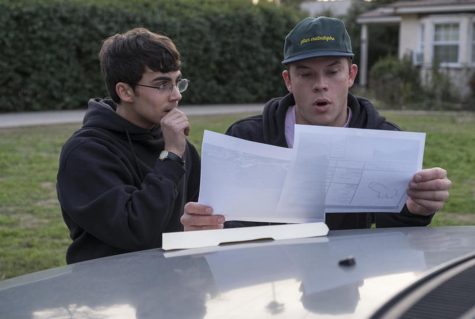
The Netflix machine has churned out “American Vandal,” a mockumentary that follows Dylan Maxwell, played by Jimmy Tatro, a high school slacker who claims he was framed for spray painting penises on 27 cars in his school staff parking lot.
Without actually taking the time to watch the show, it comes off as just another true crime/mystery series like “Making A Murderer,” only with a funnier plot. However, the laughs are not what made this show great, it was everything else viewers did not expect to see; a well written subplot that delves into topics like superficiality, betrayal, and even ethics in the media.
The show is presented as the work of students Sam Ecklund, and Peter Maldonado, who set out to prove Maxwell’s innocence by interviewing his teachers, classmates, friends, mother, and everyone else of interest. Every episode is presented as if it were a weekly online show that gets bigger in popularity every time. Eventually, the show’s popularity gets to be too much for Hanover High, who try to shut it down when teachers and staff are considered suspects.
Besides looking too professional for high school students to pull off, the lengths the show went to in order to seem authentic were very impressive and made the plot easier to digest. For example, in one episode, Ecklund and Maldonado review videos posted on social media by their classmates at a local party in order to pinpoint where and when key suspects were the night before the incident. The videos were orchestrated so carefully with every small detail that it really seemed like an actual party rather than a choreographed scene.
The acting was well enough to achieve the illusion of authenticity, and the use of younger less known actors definitely aided in doing so. Performances by Griffin Cluck and Tyler Alvarez, who play Ecklund and Maldonado, were notably convincing, and in some episodes, the relationship between the two became the focus when there is a falling out between them. Since the show itself is a comedy disguised as a documentary, the jokes aspect is less pushy and comes off as natural yet funny moments caught on video.
With so much emphasis on the mystery aspect of the show, the comedy half acts as an added bonus, but is certainly still in the forefront of the show, which has never been done so well before. The mystery keeps you hooked like a “Law & Order” episode, but the constant stream of jokes come at you like a Seth Rogen movie.
Although the plot seems simple enough, every episode reveals new details, and since the show is also depicted as a narrative, the story eventually expands into all corners. For instance, towards the end of the show, Maldonado is confronted by one of his classmates for ruining her reputation by discussing her private life for the sake of a documentary. Moments like this happen throughout the show, leaving Maldonado in a moral quandary as to whether or not it was ethical to throw heavy allegations around at people who are possibly innocent.
Every possible theory as to who could have committed the vandalism and their motive is discussed in length, but what makes the show unique is that its high school setting allows the motives to be mostly petty things that are only important to teenagers. Some petty things include when one student claimed to have gotten to third base with the hottest girl in school is investigated, resulting in a hilariously frivolous yet critical breakdown of each suspects sexual history. The writing was clever enough to keep viewers interested in the actual mystery, even though the whole situation was completely ridiculous.
The mystery of who spray painted the cars,*spoiler alert* is not completely revealed, technically, although Maxwell’s innocence is proven. Do not be discouraged, the ending is still satisfying to watch, and even opens the door to a second season, when Maxwell is suspected of a new crime, one that he also claims he did not do.

